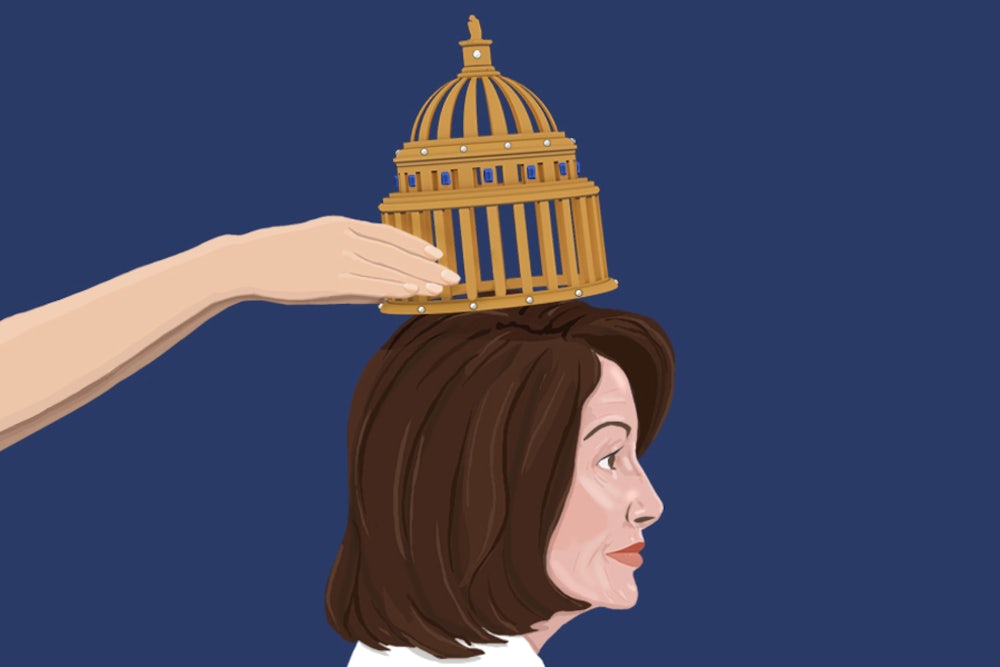At a San Francisco gala to raise money to fight climate change in September, Nancy Pelosi ran into Jane Goodall, the famed primatologist, and snapped a selfie with her “dear friend,” as the House minority leader described her. Pelosi had had a hand in funding Goodall’s work years earlier. Before she went into politics, Pelosi was on the board of the Leakey Foundation, which has funded major scientific breakthroughs about human prehistory by Goodall and others. She remains an avid amateur paleontologist, and even went to Kenya on a dig with her children in 1989.
“Evolution, the way humans learned and changed over time, it’s amazing,” Pelosi told me recently. “You can learn so much.”
Her understanding of evolution has served her well in Washington, where politicians, like all primates, have to fight to survive, and the next generation tends to eat the last. But two years into the Trump administration, Pelosi, the once and potentially future House speaker, is no longer a predator. She’s prey.
The minority leader has spent almost her entire political life under threat. Conservatives have vilified her as a San Francisco wingnut who wants to drag America into socialized health care, weaken the military, and throw money around like confetti at a Pride parade in the Castro. (They often trot her out as the unwitting star of their attack ads, linking her to Democratic candidates all over the country.) At times, moderates in her own party have piled on. Last year, Tim Ryan, a centrist Democrat from Ohio, led an insurrection in which 63 members voted to remove her as minority leader. Now, however, Pelosi is under assault from a new cohort: the left politicians eager to distance themselves from an ossified Democratic establishment. Dozens have rushed to announce that they wouldn’t support her for speaker should they take back the House in November. “While I respect Leader Pelosi’s years of advocacy on behalf of California and the Democratic Party,” said Gil Cisneros, the Democratic nominee for a Los Angeles House seat and a self-described Bernie Sanders Democrat, “it’s time for new leadership.”
Democrats should be careful what they wish for. Pelosi’s longtime number two, and the person most likely to succeed her if she is pushed out, is Steny Hoyer, a moderate Blue Dog Democrat from Maryland. No matter how much left-wingers pillory Pelosi’s willingness to compromise with Republicans, and her ties to big donors, she is still a better fit than Hoyer for their agenda. She may not be a purist, a Democratic socialist, or even particularly charismatic. But she understands her party and the pressures it faces. Democrats can dismiss her as a relic, a fossil like those she was hoping to dig up in Kenya, but they may be surprised at how much of an asset she can be.
When Pelosi first entered House leadership as minority whip in 2001, her party was still full of Blue Dogs and Bill Clinton’s New Democrats. An early proponent of marriage equality and a champion of women and minorities within the Democratic ranks, Pelosi was decidedly left of center.
Republicans would go on to depose leader after leader: Majority Leader Eric Cantor fell to a Tea Party challenger; Speaker John Boehner was forced out in a rebellion engineered by the Freedom Caucus; and the current Speaker, Paul Ryan, is stepping down of his own accord, leading an exodus of more than 40 longtime GOP House members this fall (and essentially handing Democrats a shot at taking back the House). Meanwhile, Pelosi has consolidated her power.

Much of her resiliency lies in her strength as a legislator. Unlike Boehner and Ryan, who were viewed as giving up too much ground to extremists within their own party, Pelosi has always kept recalcitrant members in line. “I think she was the most effective speaker in a very long time,” said Norm Ornstein, a scholar at the conservative American Enterprise Institute. “Tough, focused, and able to keep a caucus with wide variance in views and political pressures together.” Her deal with pro-life Democrats to push through Obamacare in 2010 remains one of the more masterful moments in recent political history. She got cap-and-trade passed in the House by winning over—unbelievably in retrospect—enough Republican votes for that climate change measure. (It would later fail in the Senate.) And she created the independent Office of Congressional Ethics, over strong GOP opposition and a lot of skepticism among Democrats, who would later see it used against members of their own party, including Charlie Rangel and Maxine Waters.
Most important—it’s Washington, after all—Pelosi is valuable because she is still the top fundraiser in Congress, Republican or Democrat. Forcing her out would mean replacing the more than $100 million she raises each cycle. Her fundraising skills are one of the key reasons she has been able to fend off threats as long as she has, despite how unpopular her ties to big donors have made her with some on the left.
Still, over the last two years, Pelosi’s grasp on power has grown more tenuous. “In the past, the challenges to [her] leadership have come from the more moderate members,” said Michele Swers, a government professor at Georgetown who has written several books on women in Congress. Even now, many moderate Democrats are running on promises to oppose her speakership if elected. Clarke Tucker, a Democratic candidate in Arkansas, has vehemently criticized Pelosi’s leadership. So has Conor Lamb, a Democrat who won a special House election in Pennsylvania earlier this year after distancing himself from Pelosi. “It’s clear that this Congress is not working for people,” Lamb said in January. “I think we need new leadership on both sides.” The difference now, Swers said, is that “she is also being challenged by more liberal members.”
The very things that make Pelosi such a capable leader have turned the insurgent left wing against her: the willingness to make deals, to thread a needle in a touchy political situation, to give others credit for her wins, and to draw moderate votes from the other side. Now, though, she has to contend with an unruly Democratic opposition no longer willing to be deferential to those in power—not just the man in the White House, but their own leadership.
Still, the chances of Pelosi’s being deposed remain relatively low. By some counts, more than four dozen incumbents and candidates have said they will vote against her. That’s not enough to oust her in a caucus vote—it would take a majority of Democrats, at least 110 votes, to do that. The threshold is different if someone were to engineer a vote on the House floor. Such a vote would include Republicans; and if Democrats win a narrow majority of 218 seats in November, and even a single Democrat defects on the House floor, it would sink her speakership. (The mere threat of such a vote succeeded in ousting Boehner in 2015.) The larger the win, of course, the more votes Pelosi can afford to lose, and this is shaping up to be a wave.
There’s also the question of whether the left really wants her out, no matter their rhetoric on the campaign trail. If Pelosi steps aside without a vote, as some have called on her to do, Hoyer will be gunning for the speakership in January. Perhaps as a result, left-wing candidates like New York’s Alexandria Ocasio-Cortez have been cautious about calling for Pelosi to resign. (Ocasio-Cortez has refused to say whether she’d vote for Pelosi as speaker and has even praised her leadership in the past.)
Furthermore, efforts to reduce the number of closed primaries and hyper gerrymandered districts—which produced the Tea Party in 2010—may lead to more moderates in Congress, particularly among Democrats. So it seems likely that the far left will remain a minority for the foreseeable future. And given the choice between Pelosi or Hoyer, those on the left would probably choose Pelosi: Her politics more closely align with their own.
Still, someday, someone will succeed her. Pelosi has lost many heirs apparent over the last decade—Rahm Emanuel to Obama’s White House, Chris Van Hollen to the Senate, and Xavier Becerra to California politics—all except Hoyer. If not him, her successor could be another politician whose career she’s helped foster, like New York’s Hakeem Jeffries or California’s Eric Swalwell. It might even be a woman. Pelosi has fought hard for female members, working to increase their ranks from just 20 percent of the caucus when she became minority leader in 2003 to 32 percent today. Their numbers are poised to increase if things go as expected in November. That fact, perhaps more than anything, undermines the idea that Pelosi is a political relic. She has been instrumental in helping the party evolve. And how many female legislators will want to kick the most powerful woman within their ranks out on the heels of the second Year of the Woman?
Ultimately, Democrats should avoid making the same mistakes the GOP did before them: Party unity is the key to survival. Or, they can take a lesson from Pelosi’s hobby, paleontology. Spend less time eating their own, and they might have a better shot at keeping control of Congress if they win in November.

